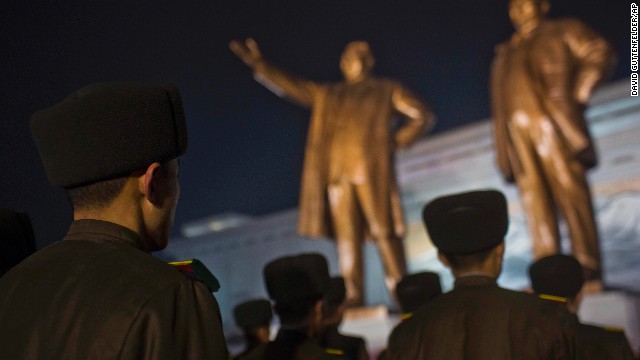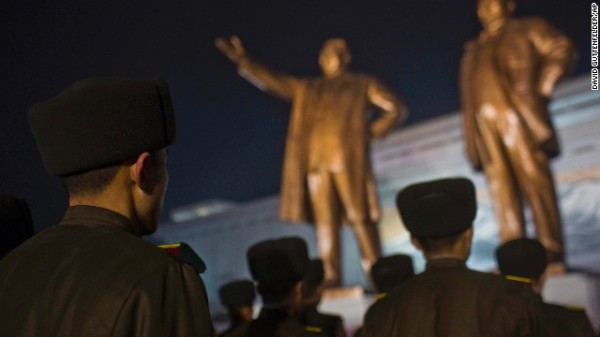
North Korean soldiers pay their respects at the base of statues of the late leaders Kim Il Sung and Kim Jong Il in Pyongyang.
STORY HIGHLIGHTS
- Two-year anniversary marked for death of Kim Jong Il
- North Korea’s top brass attended ceremony
- Attention to North Korea after execution of Kim Jong Un’s uncle
- New: More restrictions in North Korea
On the second anniversary of the death of former North Korean leader, Kim Jong Il, the nation held a memorial in his honor, lauding his life and achievements.
During the ceremony, his son, Kim Jong Un sat front and center below the image of his father, which was festooned in gold-colored flowers. He assumed power after his father’s death in 2011.
The memorial marking the death of the elder Kim brought out what looked like thousands of party members and military personnel, who dressed in black or in green uniforms, into Pyongyang Gymnasium. They clapped in in synchrony, raising their hands above their shoulders.
The anniversary came a week after an uncharacteristically public announcement of the execution of Kim’s uncle, Jang Song Thaek that raised speculation about turmoil within the North Korean leadership.
Showing allegiance
During Tuesday’s ceremony, the remaining top brass, appearing solemn, flanked Kim. All the levels of power and control of North Korea appeared to be there, to show allegiance to Kim and the state, said Daniel Pinkston, senior analyst of the North East Asia region for the International Crisis Group.
Anniversary ceremonies pertaining to the North Korea’s founder, Kim Il Sung and his son, Kim Jong Il are common.
“Kim Jong Un is using those dates for ceremonies as opportunities to have people in the leadership extend pledges of allegiance and loyalty to the regime, to the party and Kim Jong Un as a leader,” said Pinkston.
“There was a lot more eyes on it because of the recent purging and execution of Jang Song Thaek.”
‘Human bullets and bombs’
In a separate event on Monday, members of the North Korean military — the Korean People’s Army — swore to uphold Kim as leader and to defend him unto death at a meeting at Kumsusan Palace, reported the North Korean state news agency, KCNA. The participants “solemnly pledged to become human bullets and bombs” and to know only Kim, according to KCNA.
The execution of Jang last week came as a shock.
Jang, who was Kim’s uncle by marriage, had been regarded as the second-most powerful figure in the secretive nation. Denounced as a “traitor for all ages” and “worse than a dog,” he was executed for trying to overthrow the state “by all sorts of intrigues and despicable methods.”
His crimes on KCNA included: Behaving arrogantly, unwilling to stand up from his seat and “half-heartedly clapping.”
His widow and the current North Korean leader’s aunt, Kim Kyong-hui did not appear to attend the Tuesday anniversary commemorating the death of her brother. However, she was mentioned in a KCNA report this weekend, suggesting she had survived her husband’s purge.
For the rest of the North Korean population, the situation may be tense.
Sokeel Park, director of Research and Strategy at Liberty in North Korea, an NGO, said he had heard from defectors secretly communicating with family members inside North Korea that there have been greater restrictions. This is common during anniversaries marking the Kims.
“I’ve heard of increased restrictions on movement, and increased restriction on the market,” Park said. “The general atmosphere is one of lockdown. Combine that with the quite shocking news to North Korea that Jang Song Thaek was looking to overthrow the leadership — that’s shocking in any society. That contributes to this tense atmosphere among North Korean people.”
Signs of instability?
The execution of Jang has unsettled some North Korea observers as well as its neighbors, as they look for signs of instability in the government and possibility of provocation.
The South Korean defense ministry said Jang’s death could be a major turning point in North Korea since the founding of its power 68 years ago and there could be a provocation early next year. But the ministry’s spokesman Kim Min-seok said that there is no “imminent sign of North Korea carrying out nuclear and missile tests.”
Park Geun-hye, the South Korean president said on Monday before a meeting with diplomatic and security ministers, that she could not rule out “reckless provocations” from the north.
U.S. Secretary of State, John Kerry called Kim “reckless” and” insecure” following the execution of his uncle, stating that it makes having a nuclear weapon in the hands of somebody like him “even more unacceptable.”



Leave a reply